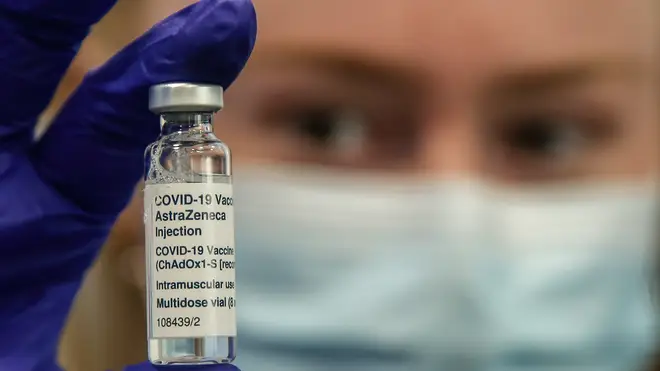
Ian Payne 4am - 7am
25 May 2021, 23:29

Doctors have been urged by experts to look for signs of stroke in people who received the Oxford/AstraZeneca jab, after three patients were hospitalised.
The warnings come after two women in their 30s and a man in his 40s suffered clots in their large arteries, following the jab, leading to ischaemic strokes.
But it was stressed that the chances of this happening were very small.
The team of experts, including academics from the National Hospital for Neurology and Neurosurgery at University College London (UCL), recommended that NHS staff look out for any signs of a stroke approximately a month after getting the vaccine.
Members said people should be "urgently evaluated" for vaccine-induced thrombosis and thrombocytopenia (VITT).
It was emphasised that it is a very rare syndrome but needs to be diagnosed and managed by a team of experts quickly.
The risk of getting a blood clot remains higher from contracting the Coronavirus than from taking the Oxford vaccine.
The number of people who have experienced blood clots from VITT is around one in 100,000 doses.
Read more: Pfizer and AstraZeneca vaccines offer 'high levels of protection' against Indian variant

Aspirin is 'probably more dangerous' than Oxford jab says SAGE member
The lead author of the report, David Werring, said: "Although cerebral venous thrombosis - an uncommon stroke type in clinical practice - is now recognised as being the most frequent presentation of VITT, our study shows that the much more common ischaemic stroke, due to arterial thrombosis blocking blood flow to part of the brain, may also be a presenting feature of vaccine-induced thrombosis.
"Of course, both types of thrombosis remain extremely rare, but doctors need to be vigilant if patients present with typical stroke symptoms (eg face, arm or leg weakness, or impaired speech) due to a blocked artery any time between days four and 28 post-vaccination."
A 35-year-old Asian woman, who later died from the stroke, initially experienced a headache on the right side and around her eyes six days after receiving the vaccine.
After another five days, she felt drowsy as well as weakness in her face, arm and leg.
She underwent brain surgery to relieve the pressure on her skull, but it was unsuccessful in saving her life.
Read more: Under 40s to be given alternative to Oxford-AstraZeneca vaccine
Read more: More than 50 million doses of coronavirus vaccine now given in England

Should we be worried about the Oxford/AstraZeneca vaccine?
The two other patients were a 37-year-old white woman and 43-year-old Asian man.
The woman suffered with a headache, confusion, weakness in her left arm and loss of vision on the left side 12 days after her vaccine. After multiple treatments, she survived.
The man had problems speaking and understanding language three weeks after his vaccine, but he remains stable following a platelet and plasma transfusion as well as other treatments.
In a linked commentary, Professor Hugh Markus, from the department of clinical neurosciences, at the University of Cambridge, said: "During the current period of Covid vaccination, a high index of suspicion is required to identify thrombotic episodes following vaccination.
"However, it is important to remember that these side-effects are rare, and much less common than both cerebral venous thrombosis and ischaemic stroke associated with Covid-19 infection itself."